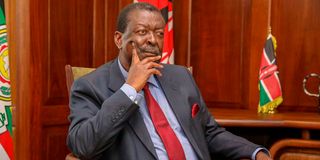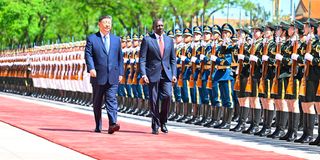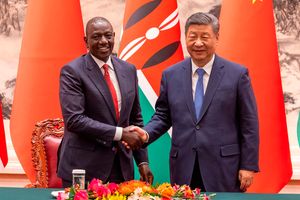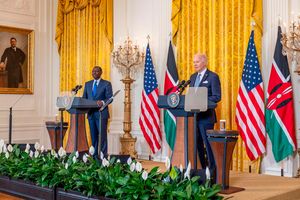
Prime Cabinet Secretary Musalia Mudavadi in his office in Nairobi on May 22, 2025.
Kenya is walking a diplomatic tightrope as it seeks to strengthen ties with global powers — both in the East and West.
This tough balancing act has recently been put to test after a senior United States senator criticised President William Ruto’s recent speech in China.
Nairobi swiftly lodged a formal protest. Prime Cabinet Secretary Musalia Mudavadi defended the government, saying Kenya remains firmly committed to a non-aligned foreign policy even as it deepens engagement with Beijing.
In an exclusive interview with Sunday Nation, Mr Mudavadi, who is also the Cabinet Secretary for Foreign and Diaspora Affairs, revealed that his ministry had officially written to the chairman of the US Senate Foreign Relations Committee, Senator Jim Risch. He expressed concern over the senator’s comments that suggested President Ruto was aligning Kenya with China or any other emerging blocs, including BRICS, at the expense of traditional Western allies.
“I have written formally to the senator... and told him that he did not appreciate the context of the President’s remarks. President Ruto is the African Union’s climate champion. His speech at Peking University must be understood within the framework of global economic reform and environmental justice,” Mr Mudavadi said.

President William Ruto, accompanied by his Chinese counterpart Xi Jinping inspect a guard of honor at the Great Hall of the People in Beijing, China.
President Ruto, at the end of April, made a State Visit to China, where he and his host Xi Jinping signed major trade and investment deals.
While in Beijing, Dr Ruto pledged to build closer ties with China, saying that a global trade war triggered by President Donald Trump’s tariffs could deal a “death blow” to the world order.
Many African nations face uncertainty over the tariffs, which threaten key industries that export to the United States. The US is one of Kenya’s largest export destinations, while China is Kenya’s top supplier.
During a keynote speech at China’s prestigious Peking University, President Ruto criticised the UN Security Council and the current world order, calling it “broken, dysfunctional and no longer fit for purpose.” He said that the tariffs imposed by President Trump “may be its final death blow”. The President said that Kenya wants to learn from “China’s remarkable journey of transformation in governance, economic development and global leadership”.
This, however, enraged Washington, with Senator Risch warning that Nairobi's new foreign policy direction could have serious diplomatic consequences.
Mr Risch, the powerful chairman of the US Senate Foreign Relations Committee, openly questioned Kenya's loyalty to the West during a Senate hearing on East Africa and the Horn of Africa.
“Just last month, President Ruto declared that Kenya, a major non-Nato ally, and China are ‘co-architects of a new world order.’ That’s not just alignment to China; it’s allegiance... Relying on leaders who embrace Beijing so openly is an error. It’s time to reassess our relationship with Kenya and others who forge tight bonds with China,” he said.
Mr Mudavadi, however, emphasised that President Ruto is the champion for Africa reforms.
“I don't think these facts were known to the senator in the US when he spoke to this. So, I want to reassure everybody that was the context. And, therefore, to imagine that we have sour relations between Kenya and the US is not true,” the CS said.
He dismissed fears that Kenya was pivoting towards the BRICS, a forum of cooperation of leading emerging economies originally comprising Brazil, Russia, India, China, and South Africa, but has since expanded to include Ethiopia, Indonesia, Iran, and the United Arab Emirates.
Mr Mudavadi described the claims by the senator as "uninformed speculation”.
“Our President swore allegiance to the people of Kenya under our Constitution. The idea that he is pledging loyalty to a foreign power is baseless,” he said.
Kenya has long been regarded as a strategic ally of the United States in East Africa, hosting American military personnel, counter-terrorism operations, and maintaining deep economic ties through trade and development assistance. However, Nairobi has simultaneously courted stronger partnerships with Beijing, particularly in infrastructure development.
China remains Kenya’s largest bilateral lender and a major trade partner, financing and constructing flagship projects such as the Standard Gauge Railway and key expressways. The growing Chinese footprint in the region has led to unease among Western allies, including the US.
Still, Mr Mudavadi said Kenya was committed to a non-aligned, interest-based foreign policy, and the continued engagement with all partners—including China, the US, Russia, and Middle Eastern powers—based on mutual benefit.
“We will pursue good relations with all countries—China, the US, Iran, Japan, Uganda, Tanzania, the UK—provided it benefits Kenya,” he said.
The CS underscored that Kenya’s foreign relations strategy, recently ratified by Parliament and gazetted as public policy, enshrines these principles of balanced engagement. To affirm Kenya’s commitment to its long-standing ties with Washington, Mr Mudavadi noted that he held cordial bilateral meetings with US Secretary of State and the US Trade Representative, around the same time the senator issued his remarks.

President William Ruto with Chinese President Xi Jinping during bilateral talks at the Great Hall of the People in Beijing, China.
“Those meetings were very productive. There is no rift between Kenya and the US,” Mr Mudavadi said, seeking to downplay speculation of diplomatic fallout.
Kenya’s diplomatic balancing act reflects a broader African trend of "strategic hedging"—deepening ties with both Western and Eastern powers to maximise development opportunities and autonomy in global affairs.
Compete for influence
As major powers compete for influence on the continent, African nations like Kenya are increasingly asserting their right to multi-alignment rather than being caught in a binary East-West contest.
President Ruto’s assertive engagement on global financial reform, particularly through the IDA21 initiative—a push for $100 billion in concessional funding for low-income countries—has further positioned Kenya as a thought leader in shaping a new global economic order.
With the next US-Africa Summit and several international climate and finance conferences on the horizon, Kenya’s role on the world stage is only set to grow, according to authorities.
On the concerns that Kenya was slowly drifting towards BRICS, Mr Mudavadi said that is not the case.
“No. In fact, if you will check our sessional paper, which has been approved by Parliament, some of the issues that people are speculating about have actually been discussed in the sessional paper, which has gone through public participation, which has been approved and gazetted by the government.
“So, it is public document. In the context of what was said, it went further to allude that the President of Kenya is paying allegiance to another nation. I have to say that first of all, when the President of Kenya is taking his oath, it is in the Constitution. If you refer to the Constitution we have, inside there, there is the oath of the President of Kenya. His allegiance is to the people of Kenya, and the Constitution of Kenya and not any other authority or entity.”
“…there is an English saying that ‘an Englishman's home is his castle’. So, even if you live in a hut, that is your castle and so, we will continue to pursue good relations with China and all other nations.
“We will continue to pursue good relations with America. We will continue to pursue good relations with Japan, Uganda, with Tanzania, with the UK and every nation. We will continue to pursue good relations with nations that are mutually beneficial to Kenya and those specific nations that we are entering into agreements with.”
Mr Mudavadi affirmed that no nation prospers in isolation.







